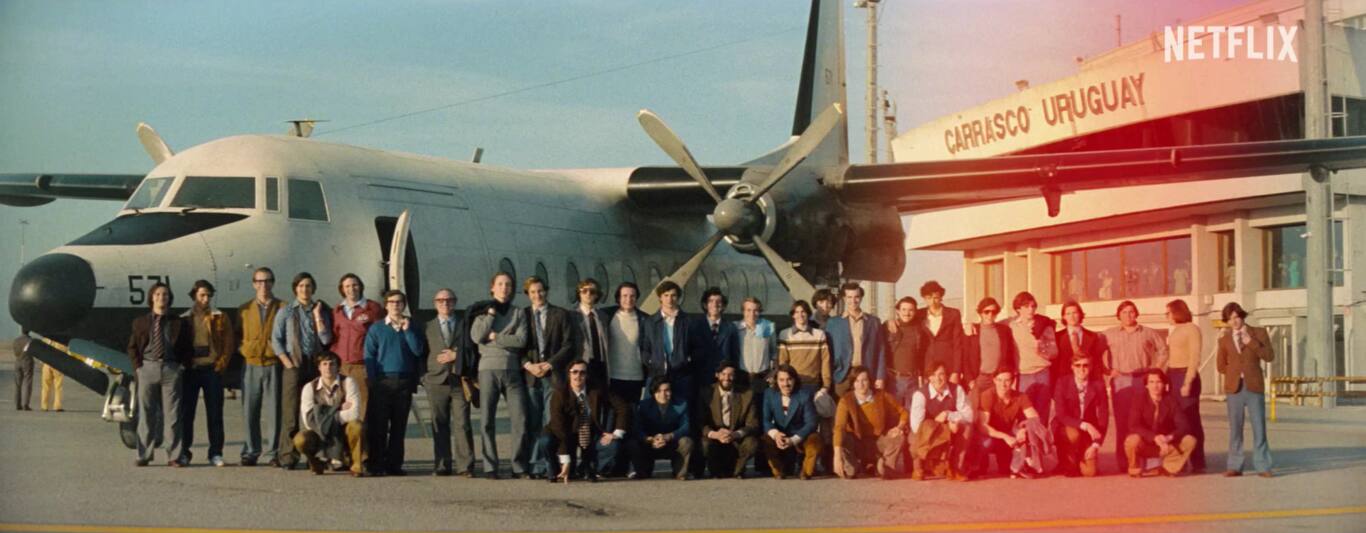



“Why doesn’t god tell me what to do on a mountain?” the survivor of a deadly plane crash in the middle of the snowed-in Andes, asks, in Netflix’s Society of the Snow. It’s more an acceptance of defeat than a spiritual inquiry, in a film that tests the prerogatives of both faith and human fortitude. A retelling of the Miracle of the Andes, the true story of a rugby team’s survival on a glacier, this film – also Spain’s official entry to the Oscars - is as much a hard-hitting survival drama as it is an exploration of the guilt that comes with making adversarial choices. It’s unforgiving, sharp, stunning to look at and shattering to consider and absorb as a chronicle of human defiance.
Uruguayan Flight 571 takes off from Montevideo in Uruguay for the Chilean city of Santiago. Aboard this plane is the ill-fated rugby team alongside friends and family, on their way to participate in a tournament. We are shown glimpses of their game, a rough character sketch of the way most of these young men talk, perform and collaborate under duress. It’s all done to set up what is to come - a voyage that dips and dives into the arms of a glacier locked in from all sides by un-scalable mountain ranges. Miraculously, a significant chunk of the team survives the crash. Horrifyingly, they had to survive the biting cold, the extreme climactic shifts and raw, unbridled hunger.
The film directed by J.A. Bayona draws from material – including books – written about the accident and the events that transpired after. The key hook or sentimental flip here is the fact that the survivors eventually turned to cannibalism – a piece of information that was initially withheld from the public after their rescue. The peripheral details of this unlikeliest of survivor tales is available but the manner in which it is filmed, choreographed and unleashed onto the viewer is devastatingly effective. We witness the slow dimming of the moral light as ethical restraint finally gives way to the turbulence of hunger. Rather than moralise, though, the film merely paints the scene of the disaster, places you in the middle of its weather-beaten ferocity until the uniformity of all that snow begins to eat at you.
Thankfully, this unflinching piece of filmmaking abstains from romanticising its protagonists. These aren’t heroes, just men who interchangeably become the faces of confusion, loss and desperation. At some point they are too hungry, dry and tired to even grieve. They volunteer to both eat and be eaten with the kind of unsentimental nerve that feels eerie. Which makes Society of The Snow a daring comment about the art of community, of giving and sharing, even in the face of certain loss. It’s as hopeful as it feels despairingly uncomfortable.
 There are no anti-heroes in Society of the Snow, but simply a litter of young men faced with a massive survival challenge. (Screen grab/YouTube/Netflix)
There are no anti-heroes in Society of the Snow, but simply a litter of young men faced with a massive survival challenge. (Screen grab/YouTube/Netflix)The survival of 16 men from the original crew on-board the ill-fated flight is considered miraculous for a number of reasons; the fluctuating temperatures, the sheer time that elapsed between the crash and rescue (72 days) and the fact that at that height, it was practically impossible to maintain body temperature without eating any solid food. The key and maybe the philosophical blister at the core of this tale is the cannibalism the survivors resorted to; in some cases, even eating family to stay alive. To that stance, the film is sympathetic and doesn’t bother stretching to interpret the exposed primality of a group of men turning into animals to extend the rest of their very much human lives. Such colourful interpretations can be found in other retellings of the disaster. Society of the Snow simply wants to transport you to the site, bury your head in the snow and wave in the shivering cold of the Andes as it leaves you withering with a sense of paranoia and defeat.
Society of the Snow is particularly affecting when it is a mix of both spectacle and deliberately unfocussed drama. There are conversations here that randomise the suffering as opposed to tying them to people and their personalities. It’s a risky approach, considering most films of its ilk would rather build themselves around characters, but Bayona intends to frame a scattered but evenly felt sense of suffering. The kind that doesn’t hit colourfully erratic groups of misfits and anti-heroes, but simply a litter of young men with the world in their palms and a glint in their eye. These men don’t have to come from rigidly evocative backstories or traumatic trails to be considered indispensable pockets of memory, the film says. They are the journeys they dream about, the flights they take and catastrophes they survive.
Society of the Snow is now streaming on Netflix.
Discover the latest Business News, Sensex, and Nifty updates. Obtain Personal Finance insights, tax queries, and expert opinions on Moneycontrol or download the Moneycontrol App to stay updated!
Find the best of Al News in one place, specially curated for you every weekend.
Stay on top of the latest tech trends and biggest startup news.